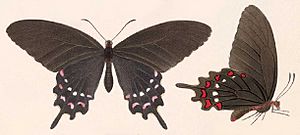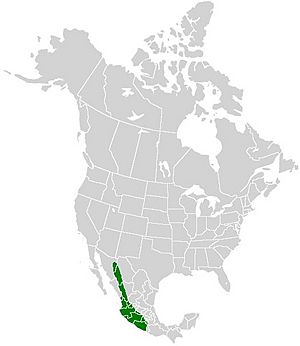White-dotted cattleheart facts for kids
Quick facts for kids White-dotted cattleheart |
|
|---|---|
 |
|
| Scientific classification | |
| Kingdom: | |
| Phylum: | |
| Class: | |
| Order: | |
| Family: | |
| Genus: | |
| Binomial name | |
| Parides alopius |
|
 |
|
The white-dotted cattleheart (Parides alopius) is a beautiful species of butterfly. It belongs to the swallowtail family, which is called Papilionidae.
This butterfly mostly lives in Mexico. It has also been seen one time in the United States, in a place called southeastern Arizona.
What Does It Look Like?
The top part of the white-dotted cattleheart's wings is black. The back wings have two rows of spots. The first row of spots is white. The second row of spots is pink.
Male butterflies usually have fewer white spots than females. The underside of their wings looks a lot like the top side. The pink spots on the underside are even easier to see than the ones on top. This butterfly has a wingspan of about 3 to 3.5 inches.
Life Cycle
The caterpillar of the white-dotted cattleheart has black and white stripes. It also has yellow and reddish-brown soft areas on its body. Each side of the caterpillar's body has red, orange, and white spots.
The chrysalis (which is like a cocoon for butterflies) is a blue-green color. Its head, parts of its chest area (called the thorax), and its belly (called the abdomen) are a bright yellow-green. Scientists are not sure if the chrysalis can also be a brown color. The chrysalis looks similar to the chrysalis of the pipevine swallowtail (Battus philenor).
The adult butterfly, also called the imago, can be seen from March to November. It likes to live in forests where there are both pine and oak trees.
What It Eats
The only plant that the white-dotted cattleheart caterpillar is known to eat is Watson's pipevine (Aristolochia watsoni). This plant is called its "host plant."
See also
 In Spanish: Parides alopius para niños
In Spanish: Parides alopius para niños
 | Leon Lynch |
 | Milton P. Webster |
 | Ferdinand Smith |

